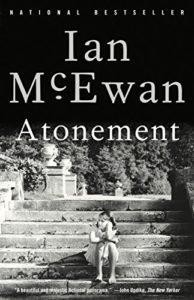Books
What an Unlikeable Character Taught Me About Ethics and Writing

We regularly be taught probably the most from books that we discover difficult and even uncomfortable. Some characters aren’t relatable in a pleasing means, however as an alternative expose or exaggerate our personal flaws. Briony Tallis, the protagonist of Ian McEwan’s Atonement, had this impact on me. Within the first chapter, set in 1935 England, 13-year-old Briony’s cousins come to stick with her whereas their mother and father are getting divorced. Briony tries to drive her cousins to behave out a play she’s written. They’re exhausted and appear traumatized by the divorce. Even after they inform her that they’ve little interest in appearing, she utterly disregards their emotions.
Studying this ebook in highschool, I discovered Briony callous but additionally felt a shiver of recognition. Like Briony, I all the time wished to be a author. In contrast to her, I’m an solely baby. Years earlier, I’d usually “performed” by attempting to steer different children to behave out scripts I’d written. Pals have informed me tales of appearing equally after they had been little, significantly in the event that they grew as much as be writers, filmmakers, or administrators. Ultimately, we outgrew the impulse to regulate others. We discovered artistic retailers with collaborators who shared our pursuits. As my mother stated: “If everybody isn’t having enjoyable, it’s a must to cease!”
Briony’s egocentrism, nevertheless, solely deepens. She wonders: “Was everybody else actually as alive as she was? For instance, did her sister actually matter to herself, was she simply as precious to herself as Briony was? Was being Cecilia simply as vivid an affair as being Briony? …If the reply was sure, then the world, the social world, was unbearably difficult, with two billion voices, and everybody’s ideas striving in equal significance and everybody’s declare on life as intense, and everybody pondering they had been distinctive, when nobody was. One may drown in irrelevance” (34).
This quote encapsulates solipsism, or the philosophy that one’s personal thoughts is all that may be recognized to exist. Briony’s self-centered worldview implies that she doesn’t actually see different individuals as her equals or as autonomous. They’re simply potential actors in her performs or characters in her tales. I wasn’t aware of the idea of mental ableism on the time. On reflection, solipsism appears to recommend that some individuals—so-called “deep thinkers”—are extra alive or human than others. It’s skepticism directed solely in opposition to others.
Paradoxically, Briony concludes that every particular person’s uniqueness makes the world much less attention-grabbing, no more. That is the alternative of what most individuals consider in actual life. In fiction, although, there’s all the time a level of solipsism. Some characters have extra developed views and appear extra actual than others. Briony is a captivating, irritating baby, however she’s additionally an archetype of authors, enjoying God.
Briony sees writing as a solution to management or change actuality. Her thoughts imposes a story on occasions she witnesses, even when her interpretation is wrong. She falsely accuses a household buddy, Robbie, of raping her cousin Lola. False sexual accusations and convictions are uncommon in actual life. The false accusation is believable within the context of the story however appears controversial, particularly rereading it right now.
Briony represents a few of my greatest fears as a author: invading different individuals’s privateness or portraying them in a false gentle. She’s additionally jealous, vindictive, and curious to the purpose of being voyeuristic, embodying among the most dangerous motives for writing. She confirmed me the hazard in viewing occasions in my and others’ lives as fodder for fiction. In highschool, I seen my complete life as a captivating story, however afterward, I began selecting my matters rather more fastidiously.
Atonement is metafiction that asks troublesome questions concerning the ethics of writing, significantly about others’ personal lives. In case you’ve ruined somebody’s actual life, does it matter in case you give them a fictional joyful ending? Are false accusations forgivable in the event that they stem from infantile assumptions?
It’s as much as every reader to resolve whether or not Briony ever really atones or redeems herself. Atonement is a warning to authors to proceed with warning. It additionally confirmed me egotistical tendencies to keep away from in myself and others. Even now, after I meet a manipulative or domineering particular person, I consider Briony in that first scene, attempting to make her cousins into her characters.
Additional Studying:
Books With Unreliable Narrators
Books About Secrets and techniques



